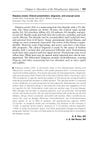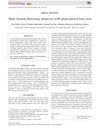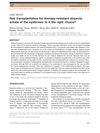
Tofacitinib helped a woman with total-body hair loss grow her hair back.
 6 citations,
January 2016 in “Skin appendage disorders”
6 citations,
January 2016 in “Skin appendage disorders” A man with rare Lichen Planopilaris lost body hair, not scalp hair, and treatment stopped itching but didn't regrow hair.
[object Object]  1 citations,
January 2023 in “SAGE open medical case reports”
1 citations,
January 2023 in “SAGE open medical case reports” A new treatment called deucravacitinib helped a patient with severe hair loss grow their hair back quickly.
20 citations,
January 2003 in “Dermatology online journal” Prostaglandin analogs like Latanoprost might help grow hair on the scalp and body.
 February 2009 in “Springer eBooks”
February 2009 in “Springer eBooks” Pregnancy can cause more body and scalp hair growth and make nails brittle, but these changes often revert after giving birth.
 January 2012 in “Yearbook of Dermatology and Dermatologic Surgery”
January 2012 in “Yearbook of Dermatology and Dermatologic Surgery” Alopecia areata is a hair loss condition that often starts before age 30 and can affect various body parts, with unpredictable hair regrowth chances.
[object Object]  49 citations,
March 2017 in “Journal of the American Academy of Dermatology”
49 citations,
March 2017 in “Journal of the American Academy of Dermatology” Tofacitinib caused significant hair regrowth in adolescents with alopecia universalis who didn't respond to other treatments.
 21 citations,
March 2015 in “Journal of The American Academy of Dermatology”
21 citations,
March 2015 in “Journal of The American Academy of Dermatology” Vemurafenib therapy can cause hair loss, but clobetasol propionate foam can help regrow hair.
 April 2016 in “Journal of the American Academy of Dermatology”
April 2016 in “Journal of the American Academy of Dermatology” Tofacitinib helped a person with total body hair loss grow hair again without bad side effects.
 January 2021 in “Our Dermatology Online”
January 2021 in “Our Dermatology Online” Oral tofacitinib successfully treated total body hair loss in one patient.
14 citations,
August 2014 in “Journal of the American Academy of Dermatology” Diphenylcyclopropenone (DPCP) is effective in treating alopecia areata, with most patients showing significant hair regrowth.
 June 2007 in “Advances in Dermatology and Allergology/Postępy Dermatologii i Alergologii”
June 2007 in “Advances in Dermatology and Allergology/Postępy Dermatologii i Alergologii” Finasteride is effective in stopping hair loss and promoting regrowth in most men with mild side effects.
 July 1987 in “Reactions (Auckland)”
July 1987 in “Reactions (Auckland)” Oral minoxidil may slow male pattern baldness and cause body hair growth, but hair loss can happen after stopping it.
 4 citations,
August 2007 in “PubMed”
4 citations,
August 2007 in “PubMed” A woman lost all her body hair after hepatitis C treatment, but it started to grow back a year after stopping the treatment.
 18 citations,
November 2012 in “Australasian Journal of Dermatology”
18 citations,
November 2012 in “Australasian Journal of Dermatology” A 66-year-old man with a rare case of male frontal fibrosing alopecia did not regrow hair despite treatment.
 3 citations,
July 2021 in “International journal of environmental research and public health/International journal of environmental research and public health”
3 citations,
July 2021 in “International journal of environmental research and public health/International journal of environmental research and public health” Two patients developed complete hair loss after Alemtuzumab treatment for MS, with no regrowth after two years.
1 citations,
November 2022 in “Journal of pharmaceutical negative results” Alopecia areata is an autoimmune condition causing patchy hair loss, with treatments focusing on immune system regulation and hair regrowth.
September 2013 in “Canadian Medical Association Journal” Alopecia areata causes sudden hair loss, often resolves within a year, but can recur.
 11 citations,
August 2010 in “Journal of Dermatology”
11 citations,
August 2010 in “Journal of Dermatology” Hair transplantation can effectively treat stable eyebrow hair loss in alopecia areata patients.
 9 citations,
December 2014 in “British Journal of Dermatology”
9 citations,
December 2014 in “British Journal of Dermatology” Hedgehog pathway inhibitors used for skin cancer can cause significant hair loss, which may improve after stopping the medication.
 7 citations,
October 2019 in “Klinická onkologie”
7 citations,
October 2019 in “Klinická onkologie” Cancer treatments often cause hair loss and damage, affecting patients' mental health.
 185 citations,
June 2014 in “Journal of Investigative Dermatology”
185 citations,
June 2014 in “Journal of Investigative Dermatology” A man with severe hair loss and skin disease regrew his hair with no side effects after taking tofacitinib.
 2 citations,
March 2015 in “Clinical and Experimental Dermatology”
2 citations,
March 2015 in “Clinical and Experimental Dermatology” Azathioprine can cause unusual hair loss, which may reverse after stopping the drug.
 3 citations,
May 2010 in “Nursing Standard”
3 citations,
May 2010 in “Nursing Standard” Treatments for autoimmune hair loss have limited success and often relapse, and emotional support is crucial for those affected.
 109 citations,
May 2011 in “Dermatologic Therapy”
109 citations,
May 2011 in “Dermatologic Therapy” Alopecia areata is a type of hair loss that can lead to complete baldness, often associated with other autoimmune conditions, and half of the cases may see hair return within a year.
 25 citations,
October 2019 in “JAAD Case Reports”
25 citations,
October 2019 in “JAAD Case Reports” Baricitinib helped a woman with severe hair loss regrow almost all her hair without side effects.
 March 2018 in “Trends in Immunotherapy”
March 2018 in “Trends in Immunotherapy” Combining triamcinolone acetonide with immunotherapy can help regrow hair in some alopecia totalis patients.
 51 citations,
June 2016 in “Journal of the European Academy of Dermatology and Venereology”
51 citations,
June 2016 in “Journal of the European Academy of Dermatology and Venereology” Tofacitinib was effective in treating hair loss in two patients with alopecia universalis.
 5 citations,
December 2019 in “JAAD Case Reports”
5 citations,
December 2019 in “JAAD Case Reports” A woman experienced rapid hair loss after taking albendazole, but it started to improve when she stopped the medication.
 March 2023 in “International journal of trichology”
March 2023 in “International journal of trichology” Six genetic conditions are often linked to complete scalp hair loss in children.


























